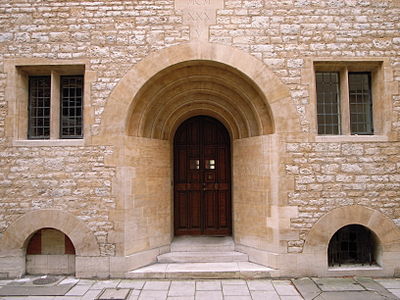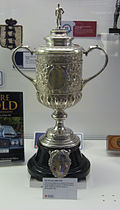Portal:University of Oxford
| Main page | Indices | Projects |
The University of Oxford portal
The University of Oxford is a collegiate research university in Oxford, England. There is evidence of teaching as early as 1096, making it the oldest university in the English-speaking world and the world's second-oldest university in continuous operation. It grew rapidly from 1167, when Henry II banned English students from attending the University of Paris. After disputes between students and Oxford townsfolk in 1209, some academics fled north-east to Cambridge where they established what became the University of Cambridge. The two English ancient universities share many common features and are jointly referred to as Oxbridge.
The University of Oxford is made up of thirty-nine semi-autonomous constituent colleges, four permanent private halls, and a range of academic departments which are organised into four divisions. Each college is a self-governing institution within the university, controlling its own membership and having its own internal structure and activities. All students are members of a college.
It does not have a main campus, but its buildings and facilities are scattered throughout the city centre. Undergraduate teaching at Oxford consists of lectures, small-group tutorials at the colleges and halls, seminars, laboratory work and occasionally further tutorials provided by the central university faculties and departments. Postgraduate teaching is provided in a predominantly centralised fashion.
Oxford operates the Ashmolean Museum, the world's oldest university museum; Oxford University Press, the largest university press in the world; and the largest academic library system nationwide. In the fiscal year ending 31 July 2023, the university had a total consolidated income of £2.92 billion, of which £789 million was from research grants and contracts.
Oxford has educated a wide range of notable alumni, including 30 prime ministers of the United Kingdom and many heads of state and government around the world. 73 Nobel Prize laureates, 4 Fields Medalists, and 6 Turing Award winners have matriculated, worked, or held visiting fellowships at the University of Oxford, while its alumni have won 160 Olympic medals. Oxford is the home of numerous scholarships, including the Rhodes Scholarship, one of the oldest international graduate scholarship programmes. (Full article...)
Selected article
The 1874 FA Cup Final was played between Oxford University A.F.C. and Royal Engineers A.F.C. on 14 March 1874 at Kennington Oval in London. It was the third final of the world's oldest football competition, the Football Association Challenge Cup (known in the modern era as the FA Cup). Both teams had previously reached the final but been defeated by Wanderers F.C. The Engineers had reached the final with comparative ease, scoring sixteen goals and conceding only one in the four previous rounds. Oxford's opponents in the earlier rounds had included two-time former winners Wanderers. The final was decided by two goals from Oxford in the first twenty minutes. Their opponents had spent two weeks training for the match, an innovative concept at the time, but were repeatedly thwarted by Charles Nepean, the Oxford goalkeeper. The Engineers were said to have missed their best back, Lieut. Alfred Goodwyn, who had been posted overseas. The 1874 final was the only occasion upon which Oxford University won the FA Cup; the team made further appearances in the 1877 and 1880 finals, but lost on both occasions. (Full article...)
Selected biography
Sir Bernard Williams (1929–2003) was an English moral philosopher, described by The Times as the "most brilliant and most important British moral philosopher of his time". He was the author of 11 books of philosophy, including Problems of the Self (1973), Moral Luck (1981), Ethics and the Limits of Philosophy (1985), and Truth And Truthfulness: An Essay In Genealogy (2002). He studied Literae Humaniores at Balliol College, Oxford before becoming a Fellow of All Souls College, Oxford. As Knightbridge Professor of Philosophy at the University of Cambridge and Deutsch Professor of Philosophy at the University of California, Berkeley, Williams became known internationally for his attempt to reorient the study of moral philosophy to history and culture, politics and psychology, and, in particular, to the Greeks. Oxford philosopher Gilbert Ryle once said of him that he "understands what you're going to say better than you understand it yourself, and sees all the possible objections to it, all the possible answers to all the possible objections, before you've got to the end of your sentence". (more...)
Selected college or hall
Wolfson College, in north Oxford on the banks of the River Cherwell, is a college for postgraduate students (about 600) and fellows. It was established in 1965 as Iffley College with grants from 12 other colleges, but it did not have any premises initially. The college was renamed in honour of Sir Isaac Wolfson, in recognition of his financial contribution to the construction of the college under its first President, Sir Isaiah Berlin. The main building, designed by Philip Powell and Hidalgo Moya, was completed in 1974 and were given Grade II listed building status in 2011. There are three quadrangles: the central quadrangle (known as the Berlin Quad), the Tree Quad built around established trees, and the River Quad into which the Cherwell has been diverted to form a punt harbour. Unlike many other Oxford colleges, there is no separate High Table or Common Room for the fellows, and the students and fellows eat and associate together. Alumni include the astronomer Richard Ellis, the novelist Iain Pears and the mathematician Nigel Hitchin. (Full article...)
Selected image

Did you know
Articles from Wikipedia's "Did You Know" archives about the university and people associated with it:
- ... that Cheshire landowner Rowland Egerton-Warburton (pictured) arranged for his house, Arley Hall, to be designed in Tudor style while the chapel was designed in Gothic style?
- ... that Herbert Armitage James, who was headmaster of Rugby School for 14 years, had one of the best stamp collections in England?
- ... that Marrack Goulding, a former Under-Secretary-General of the United Nations, was Warden of St Antony's College from 1997 to 2006?
- ... that Clive Ponting was found not guilty of violating the Official Secrets Act by a jury even after the judge, Sir Anthony McCowan, summed up strongly in favour of the prosecution?
- ... that Ion Calvocoressi won an immediate Military Cross in Libya in 1942, and was married to the sister of Ludovic Kennedy for over 60 years?
Selected quotation
Selected panorama
Wikimedia
The following Wikimedia Foundation sister projects provide more on this subject:
-
Commons
Free media repository -
Wikibooks
Free textbooks and manuals -
Wikidata
Free knowledge base -
Wikinews
Free-content news -
Wikiquote
Collection of quotations -
Wikisource
Free-content library -
Wikiversity
Free learning tools -
Wikivoyage
Free travel guide -
Wiktionary
Dictionary and thesaurus














